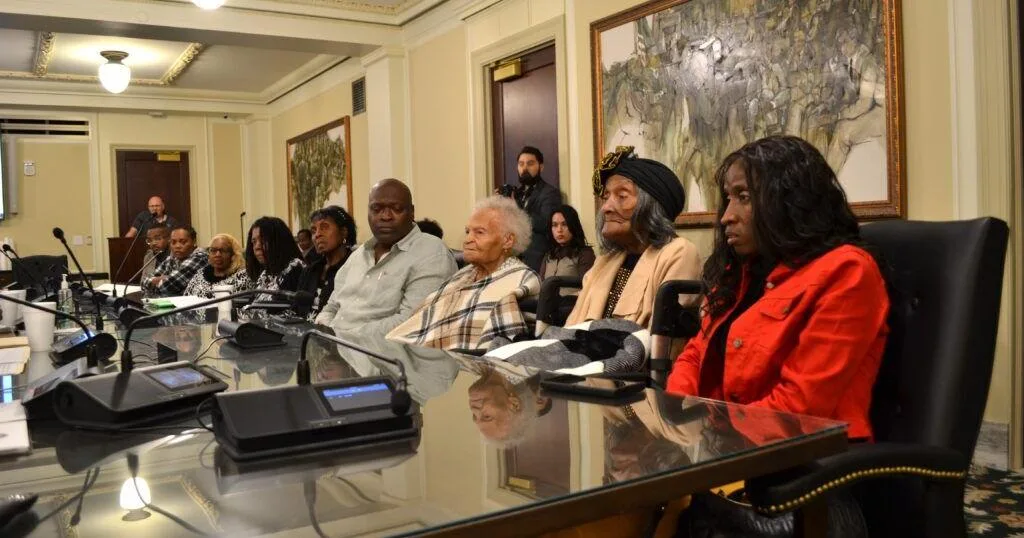
OKLAHOMA CITY — A century after their homes were burned and scores of their neighbors were killed in the Tulsa Race Massacre, victims of the 1921 attack brought their case for reparations to the state Capitol for the first time on Thursday.
Two of the three last known living survivors of the race massacre, Viola Fletcher and Lessie Benningfield Randle, attended a hearing with House lawmakers in Oklahoma City. Fletcher and Randle are 109 and 108 years old, respectively.
Tulsa Democratic Rep. Regina Goodwin, whose family survived the massacre, and the House Committee on General Government invited the survivors and other Greenwood descendants for an interim study exploring economic compensation for the victims and their relatives.
Speakers at the study said the state government, not only the City of Tulsa and Tulsa County, shares responsibility for recompense.
“We have three living survivors, two that are here, that deserve financial compensation,” their attorney, Damario Solomon-Simmons, said. “They deserve it. The state owes it, and the state should pay.”
Fletcher, Randle and Fletcher’s brother, Hughes Van Ellis, sued the city, Tulsa County officials, the regional chamber of commerce and the Oklahoma Military Department over the massacre, in which a white mob destroyed the affluent Black neighborhood of Greenwood in north Tulsa.
Multiple speakers noted the Oklahoma National Guard failed to protect Greenwood residents. Archival evidence demonstrates guardsmen detained and killed Black Tulsans during the attack, said Eric J. Miller, one of the attorneys for the survivors.
Tulsa police deputized armed white men, instructing them to “get a gun and get busy and try to get a (Black person),” according to witness accounts and records at the time.
The conflict began May 31, 1921, and continued throughout the next day. By the end, the 35 blocks of the Greenwood district were largely burned and destroyed. Multiple estimates place the number of dead in the hundreds, though an official count reported only 36 people killed.
Thousands more were left homeless while both government and insurance policies inhibited efforts to rebuild.
“After the smoke cleared, that physical violence quickly turned to policy violence and has reverberated from generation to generation,” said Tiffany Crutcher, whose great-grandmother survived the massacre.
The survivors contend they and the descendants of other victims are owed financial compensation and other restorative measures due to the damage and loss from the massacre and the economic discrimination their families experienced over the following century.
The Oklahoma Supreme Court is considering their case.
The state-organized Tulsa Race Riot Commission compiled a report in 2001 on the incident. The commission at the time recommended direct payments of reparations to survivors and their descendants.
Commissioners also suggested the state or local government establish a scholarship fund and an economic enterprise development zone in the Greenwood district.
Vivian Clark-Adams, who sat on the commission two decades ago, said taxpayer dollars have funded reparations in other parts of the country to benefit victims of racial violence and discrimination, including multiple Native American tribes and Japanese Americans who were detained during World War II.
Black families from the Florida community of Rosewood, which suffered a similar race massacre in 1923, received payments and scholarships in restitution.
“The reason the commision listed the reparations for survivors and reparations for descendants … is because they were the most important thing we think that’s needed to restore what was stolen from this community and also the best way to provide justice to the descendants and the survivors,” Clark-Adams said.
After the 2001 report, the state created a reconciliation scholarship for Tulsa students, a program now managed by the Oklahoma State Regents for Higher Education.
Funding for it has been “a pittance for a scholarship program,” said Robert Placido, vice chancellor of academic and student affairs for the state regents.
Over the past five years, 60 students have been awarded a total of $75,500 from the reconciliation scholarship fund. Two students this year received full scholarships, one of whom was a documented descendant of 1921 Greenwood residents, Placido said.
Rep. Kevin West, R-Moore, was the only Republican lawmaker to attend the study. West is the committee chairperson who presided over the hearing.
“I look forward to many conversations as we move forward about some of the ideas that were brought up with this,” West said as the interim study concluded. “I look forward to helping you on any of that that I possibly can.”
Oklahoma Voice is part of States Newsroom, a nonprofit news network supported by grants and a coalition of donors as a 501c(3) public charity. Oklahoma Voice maintains editorial independence. Contact Editor Janelle Stecklein for questions: info@oklahomavoice.com. Follow Oklahoma Voice on Facebook and Twitter.


